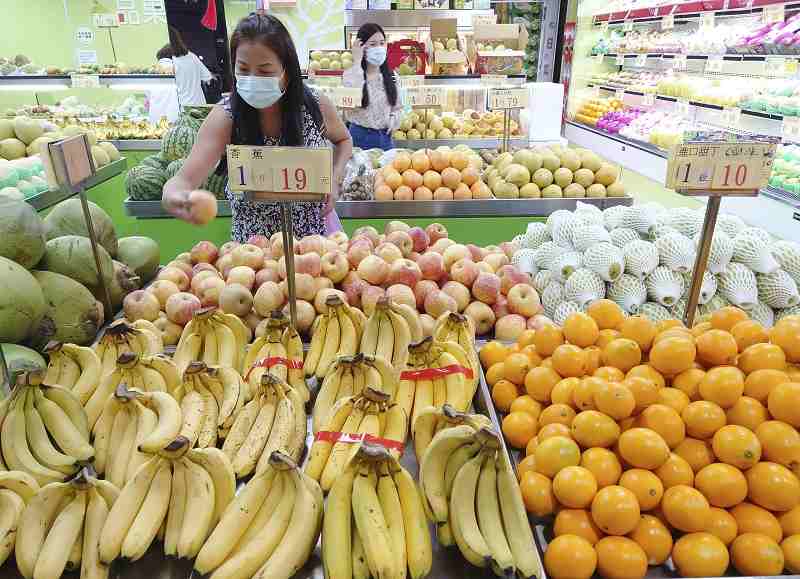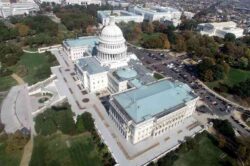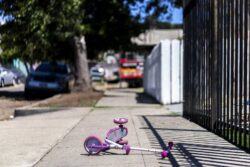China blocks some Taiwan imports but avoids chip disruption

Customers buy fruit at a stall in Taipei, Taiwan, Sept. 20, 2021.
16:50 JST, August 3, 2022
BEIJING (AP) — China blocked imports of citrus and fish from Taiwan in retaliation for a visit by Nancy Pelosi, a top American lawmaker, to the self-ruled island but has avoided disrupting one of the world’s most important technology and manufacturing relationships.
The two sides, which split in 1949 after a civil war, have no official relations but multibillion-dollar business ties, especially in the flow of Taiwanese-made processor chips needed by Chinese factories that assemble the world’s smartphones and other electronics.
They built that business while Beijing threatened for decades to enforce the ruling Communist Party’s claim to the island by attacking.
Two-way trade soared 26% last year to $328.3 billion. Taiwan, which produces half the world’s processor chips and has technology the mainland can’t match, said sales to Chinese factories rose 24.4% to $104.3 billion.
“The global economy cannot function without chips that are made in either Taiwan or China,” said Carl B. Weinberg of High-Frequency Economics in a report.
On Wednesday, Beijing blocked imports of citrus fruits and frozen mackerel from Taiwan after Pelosi, speaker of the House of Representatives, arrived in Taiwan late Tuesday. But the ruling party avoided disrupting the flow of chips and other industrial components, a step that would send shock waves through the shaky global economy.
Beijing also announced four days of military exercises with artillery fire in waters around Taiwan. That might delay or disrupt shipping to and from the island, one of the biggest global traders.
The potential disruption adds to concerns over weakening global economic growth, but Asian stock markets rose Wednesday after there was no immediate sign of Chinese military action.
The Communist Party says Pelosi’s visit might embolden Taiwan to make its decades-old de facto independence permanent. Beijing says that would lead to war.
The administration of U.S. President Joe Biden has sought to tone down the volume on the visit, insisting there’s no change in America’s longstanding “one-China policy,” which recognizes Beijing but allows informal relations and defense ties with Taipei.
Meeting leaders in Taiwan, Pelosi said she and other members of Congress in a visiting delegation were showing they will not abandon their commitment to the self-governing island.
“America’s determination to preserve democracy, here in Taiwan and around the world, remains ironclad,” Pelosi said in a short speech during a meeting with Taiwan’s President Tsai Ing-wen.
“Facing deliberately heightened military threats, Taiwan will not back down,” Tsai said.
The ban on imports of citrus fruits and frozen mackerel will hurt suppliers seen as Tsaí’s supporters.
Taiwan plays an outsize role in the chip industry for an island of 15 million people, accounting for more than half the global supply.
Its producers including Taiwan Semiconductor Manufacturing Corp. make the most advanced processors for smartphones, tablet computers, medical devices and other products. Taiwan says chip sales to China factories rose 24.4% last year to $104.3 billion.
Beijing has invested billions of dollars in developing its own industry, which supplies low-end chips for autos and appliances but cannot support the latest smartphones, tablet computers, medical devices and other products.
Chips are China’s biggest import at more than $400 billion a year, ahead of crude oil.
That concentration has fueled concern in the United States and Europe about relying too heavily on supplies that might be disrupted by conflict. The U.S. government is trying to expand its domestic chip production capacity.
Overall, China is Taiwan’s biggest trading partner, taking more than twice as much of its exports as the United States, the island’s No. 2 foreign market.
Beijing has tried to use access to its markets to undermine Tsai and other Taiwanese leaders it accuses of pursuing independence.
The customs agency blocked imports of cookies and other food products from more than 100 Taiwanese suppliers on Monday ahead of Pelosi’s visit, according to the Global Times and other Chinese news outlets. There was no official announcement.
The Communist Party also has used military action in the past to try to hurt Taiwanese leaders by disrupting the island’s economy.
The mainland tried to drive voters away from then-President Lee Teng-hui ahead of the island’s first direct presidential elections in 1996 by firing missiles into shipping lanes.
That forced shippers to cancel voyages and raised insurance costs but backfired by allowing Lee to brag about standing up to Beijing in front of cheering supporters. Lee won the four-way election with 54% of the vote.







